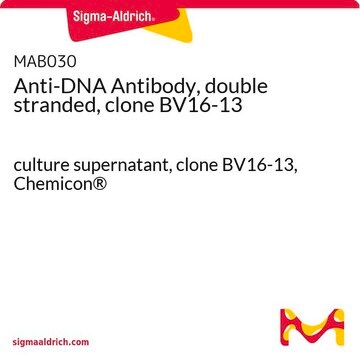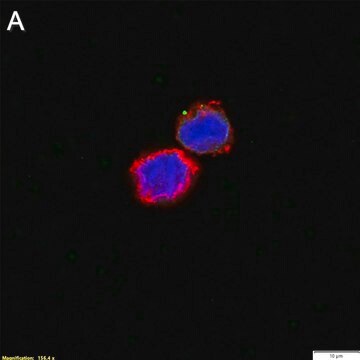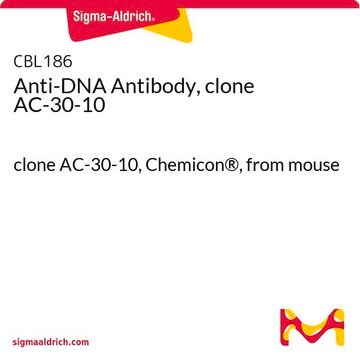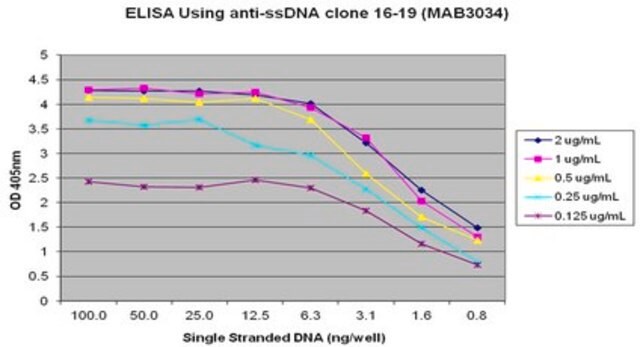추천 제품
생물학적 소스
mouse
Quality Level
재조합
expressed in HEK 293 cells
결합
unconjugated
항체 형태
purified antibody
항체 생산 유형
primary antibodies
클론
AE-2, recombinant monoclonal
제품 라인
ZooMAb® learn more
양식
lyophilized
정제법
using protein G
종 반응성(상동성에 의해 예측)
all
포장
antibody small pack of 25 μL
환경친화적 대안 제품 특성
Waste Prevention
Designing Safer Chemicals
Design for Energy Efficiency
Learn more about the Principles of Green Chemistry.
향상된 검증
recombinant expression
Learn more about Antibody Enhanced Validation
기술
dot blot: suitable
immunofluorescence: suitable
immunohistochemistry: suitable
동형
IgG1
환경친화적 대안 카테고리
배송 상태
ambient
저장 온도
2-8°C
관련 카테고리
일반 설명
We are committed to bringing you greener alternative products, which adhere to one or more of The 12 Principles of Green Chemistry. This antibody is Preservative-free, produced without the harm or sacrifice of animals and exceptionally stable to allow for ambient shipping and storage if needed and thus aligns with "Waste Prevention", "Designing Safer Chemicals" and "Design for Energy Efficiency". Click here for more information.
ZooMAb® antibodies represent an entirely new generation of recombinant monoclonal antibodies. Each ZooMAb® antibody is manufactured using our proprietary recombinant expression system, purified to homogeneity, and precisely dispensed to produce robust and highly reproducible lot-to-lot consistency. Only top-performing clones are released for use by researchers. Each antibody is validated for high specificity and affinity across multiple applications, including its most commonly used application. ZooMAb® antibodies are reliably available and ready to ship when you need them.
특이성
Clone AE-2 is a ZooMAb® mouse recombinant monoclonal antibody that detects double stranded DNA. May show some cross-reactivity with single-stranded DNA.
면역원
Nuclei from Raji Burkitt′s lymphoma Cells.
애플리케이션
Quality Control Testing
Evaluated by Immunohistochemistry (Paraffin) in Human tonsil tissue sections.
Immunohistochemistry (Paraffin) Analysis: A 1:1,000 dilution of this antibody detected dsDNA in Human tonsil tissue sections.
Tested Applications
Immunohistochemistry (Paraffin) Analysis: A 1:1,000 dilution from a representative lot detected dsDNA in human prostate cancer tissue sections.
Dot Blot Analysis: A 1:1,000 dilution from a representative lot detected dsDNA extracted from HeLa cells.
Immunofluorescence Analysis: A 1:100 dilution from a representative lot detected dsDNA in human prostate cancer tissue sections.
Note: Actual optimal working dilutions must be determined by end user as specimens, and experimental conditions may vary with the end user.
Evaluated by Immunohistochemistry (Paraffin) in Human tonsil tissue sections.
Immunohistochemistry (Paraffin) Analysis: A 1:1,000 dilution of this antibody detected dsDNA in Human tonsil tissue sections.
Tested Applications
Immunohistochemistry (Paraffin) Analysis: A 1:1,000 dilution from a representative lot detected dsDNA in human prostate cancer tissue sections.
Dot Blot Analysis: A 1:1,000 dilution from a representative lot detected dsDNA extracted from HeLa cells.
Immunofluorescence Analysis: A 1:100 dilution from a representative lot detected dsDNA in human prostate cancer tissue sections.
Note: Actual optimal working dilutions must be determined by end user as specimens, and experimental conditions may vary with the end user.
표적 설명
Due to their location in the nucleus and mitochondria, dsDNA is not easily accessible to the immune system. They are quickly degraded by DNases in the cytoplasm and endosomes. However, they can be released from apoptotic cells after exposure to ultraviolet light, infection, and following some drug treatments. The released DNA can then be recognized by anti-DNA antibodies. and compose immune complexes. Extracellular nucleic acids containing immune complexes can be captured by immature dendritic cells (iDCs) via FcγRs. These cells are activated and migrate from peripheral tissues to lymphatic organs, where iDCs undergo maturation. Anti-dsDNA antibodies are considered to be highly specific markers of Systemic lupus erythematosus (SLE) and autoimmune (lupoid) hepatitis. Their higher levels are observed in about 50 to70% of patients with active, untreated SLE. These antibodies can recognize diverse DNA structures, including single-stranded, Z-DNA, bent or elongated dsDNA, and DNA:RNA hybrids. Anti-dsDNA antibodies may have different subclasses, including IgA, IgE, IgG, and IgM. However, not all of them contribute equally to tissue injuries associated with SLE. IgG and IgA correlate more with disease activity in humans. IgM antibodies seem to be protective by enhancing the elimination of apoptotic material and via immunomodulatory effects. This ZooMAb® recombinant monoclonal antibody, generated by our propriety technology, offers significantly enhanced specificity, affinity, reproducibility, and stability over conventional monoclonals. (Ref.: Wang, X., and Xia, Y. (2019). Front. Immunol. 10; 1667; Haugbro, K., et al. (2004). Ann. Rheum. Dis. 63(4); 386-394).
물리적 형태
Purified recombinant mouse monoclonal antibody IgG, lyophilized in PBS, 5% Trehalose, normal appearance a coarse or translucent resin. The PBS/trehalose components in the ZooMAb formulation can have the appearance of a semi-solid (bead like gel) after lyophilization. This is a normal phenomenon. Please follow the recommended reconstitution procedure in the data sheet to dissolve the semi-solid, bead-like, gel-appearing material. The resulting antibody solution is completely stable and functional as proven by full functional testing. Contains no biocide or preservatives, such as azide, or any animal by-products. Larger pack sizes provided as multiples of 25 µL.
저장 및 안정성
Recommend storage of lyophilized product at 2-8°C; Before reconstitution, micro-centrifuge vials briefly to spin down material to bottom of the vial; Reconstitute each vial by adding 25 µL of filtered lab grade water or PBS; Reconstituted antibodies can be stored at 2-8°C, or -20°C for long term storage. Avoid repeated freeze-thaws.
기타 정보
Concentration: Please refer to the Certificate of Analysis for the lot-specific concentration.
법적 정보
ZooMAb is a registered trademark of Merck KGaA, Darmstadt, Germany
면책조항
Unless otherwise stated in our catalog or other company documentation accompanying the product(s), our products are intended for research use only and are not to be used for any other purpose, which includes but is not limited to, unauthorized commercial uses, in vitro diagnostic uses, ex vivo or in vivo therapeutic uses or any type of consumption or application to humans or animals.
적합한 제품을 찾을 수 없으신가요?
당사의 제품 선택기 도구.을(를) 시도해 보세요.
Storage Class Code
11 - Combustible Solids
WGK
WGK 1
Flash Point (°F)
Not applicable
Flash Point (°C)
Not applicable
자사의 과학자팀은 생명 과학, 재료 과학, 화학 합성, 크로마토그래피, 분석 및 기타 많은 영역을 포함한 모든 과학 분야에 경험이 있습니다..
고객지원팀으로 연락바랍니다.









